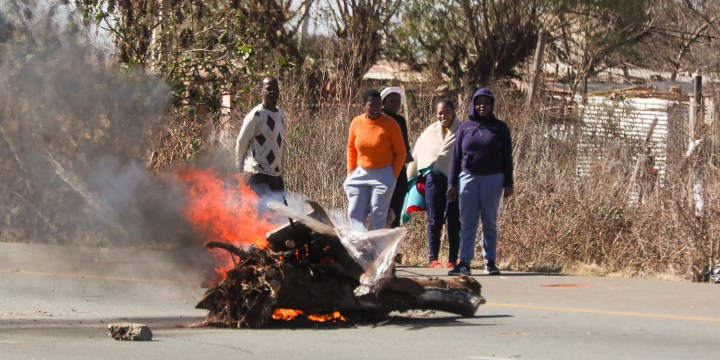TAKING TO THE STREETS OP-ED
Protests are a powerful tool of democratic expression and a legitimate form of political participation

To understand more fully the nature of protests, we need to ask why communities protest in the first place, and why other means of engagement have been ineffective. It is also necessary to question why protests are often met with a violent state response.
The people of Slovo Park, an informal settlement in Johannesburg south, blocked the N12 highway on 31 July this year. They did so as a last resort to draw attention to their lack of water access and the absence of proper sanitation.
They did so because the City of Johannesburg has yet to upgrade their settlement in accordance with the Upgrading of Informal Settlements Programme (UISP), despite being ordered to do so by the high court in 2016. Since then, Slovo Park has been electrified, but not completely.
Nothing else has improved.
Although the protest came at a considerable cost, Gauteng Premier Panyaza Lesufi hosted a public meeting in Slovo Park on 23 August 2023. This meeting only happened as a result of the protest.
The premier committed to return to the residents of Slovo Park within three weeks with a plan for how the government would address the challenges raised by the community in their week-long protest.
Although it is not yet enough, the Slovo Park protest got the premier to listen.
The Slovo Park protest is in no way unique: protests are common in South Africa.
According to data from the Institute for Security Studies’ Protest and Public Violence Monitor, South Africa saw an average of 2.26 protests daily between 2013 and 2020, peaking at 2.5 in 2019. Historically, during apartheid, protests were central to bringing about social and political change.
More recently, protests are being used as a means for groups and communities to draw attention to persistent societal challenges such as inequality, unemployment, dissatisfaction with service delivery, corruption, gender-based violence, crime and poor policing.
Protests are often perceived negatively and are therefore easy to dismiss as irrational and unreasonable. However, when repeated efforts to engage government structures or relevant institutions on pressing matters continue to fail, affected groups inevitably take to the streets.
In the case of Slovo Park, years of engaging various spheres of government since the settlement’s establishment in the early 1990s finally led residents to litigate to prevent a forced relocation by the city.
False promises
Through many years, government officials and political leaders promised the community there’d be development, but none kept their word. This has continued, even after the high court victory.
The community’s leadership body, the Slovo Park Community Development Forum (SPCDF), alongside various other stakeholders, has met with the city regularly since 2016 to support the city’s implementation of the judgment and to ensure the community’s participation in the upgrading process as required by the UISP.
The SPCDF’s assessment is that the city has shown no sense of urgency even when presented with reports of children who have died after falling into pit latrines, or when the SPCDF relayed the community’s challenges with water access.
Slovo Park’s history is evidence that protests in South Africa are often a measure of last resort, employed only after exhausting other available mechanisms and formal participatory channels such as meetings, memoranda of demands and petitions.
The community of Slovo Park even litigated successfully and still had to protest to be heard.
Another common view of protests is the conflation of disruption with violence. Section 17 of the Constitution makes provision for a right to peacefully assemble, demonstrate, picket and present petitions. Disruption, while a common feature of protests, does not inherently equate to violence.
For a protest to be violent, it must result in physical violence against people or property damage.
For many poor communities, like the one in Slovo Park, blocking a major roadway serves as a tool to attract the attention of the media, public, government and others in authority; it increases their bargaining power and adds pressure to respond to their grievances.
Violent responses
In turn, the decision to protest often comes at the risk of a violent response from the police, and for Slovo Park, their protest was marked by the death of 16-year-old Karabo Chaka, who was allegedly shot in the head by police on the first day of the protest.
The role of the police in contributing to the likelihood that a protest turns violent has been well documented. According to Viewfinder analysis of data by the Independent Police Investigative Directorate, between April 2012 and March 2019, police caused deaths in more than 70 crowd incidents, including protests.
According to the ISS, heavy‑handed policing typically contributes to a protest turning violent, although it was intended to be peaceful. This research also notes that media coverage often provides limited detail of protests, such as that the majority are non-violent.
In the case of violent protests, they may not cover the circumstances that led to the violence or who initiated the violence. But even the presence of violent individuals in a protest does not justify the indiscriminate use of force against an entire group of protesters.
To understand more fully the nature of protests, we need to ask why communities protest in the first place, and why other means of engagement have been ineffective. It is also necessary to question why protests are often met with a violent state response.
In the case of Slovo Park, the protest was an expression of a community’s deep-seated frustration with the lack of basic services and stagnant development after decades of false promises and fruitless engagement.
Ultimately, the right to protest remains a powerful tool of expression and is a legitimate form of political participation in South Africa. It must be protected.
Protest is especially vital for groups and communities that often go unheard.
An essential element of democracy, it is through protest that people are heard when all other means of engagement fail. DM
The Socio-Economic Rights Institute (Seri) and the Nelson Mandela Foundation (NMF) launched a new publication on 26 September 2023 titled Listen to Us: Reflections on protest in democratic South Africa. The publication is a visual narrative examining the history and practice of protest and challenges popular assumptions and myths associated with protest in South Africa.
Yongeza Mbimbi is a research intern at Seri. He holds a BA (Sociology and Anthropology) and LLB degrees from the University of Witwatersrand.




















You got what you voted for, why are you so disappointed or surprised there has never been a fulfilment of promises?
In terms of violence, it is ALWAYS started by the protesters and it the responsibility of the protest leaders to control their people, don’t come crying when the entire group is subject to law enforcement action, as a supposed law student you must know this
In addition. Yes, the right to protest is enshrined in or constitution, however, that does NOT give the protesters the right to infringe on anyone else’s rights, it does not give them the right to hinder the innocent passage of anyone else, it does not give them the right to blockade roads, it does not give them the right to intimidate, threaten, abuse, assault or murder anyone, particularly people that are not participating n the protest, again, as a supposed law student you should know this, you will also know (hopefully) that virtually EVERY service delivery protest comprises violence, destruction of public property, restricting people’s right to free passage, assault, abuse and intimidation of innocent people and mass disruption of infrastructure such as main arterial roads and highways. And lets not forget the looting of private individuals’ stores.
The “informal settlement” story – protest about the lack of service delivery, burn down the schools, libraries, community centers and clinics that service the community then go out again and protest about the lack of service deliver and public facilities, yes hose that the community recently burnt down, rinse and repeat
The picture that the author has used is a picture of a violent unlawful protest. Burning something on the road is damage of property (the road) and you can try to defend it as much as you want to the police must act. The protest must be controlled but mostly it is not . The few people becoming violent in a protest is part of the movement and the protester group must take responsibility for the delinquents actions. Denise Smit
Where something is burning you must always see the hands of the EFF in it. Denise Smit
Protest only works if someone is listening or there is some consequence for leaders whether in government or industry. Since there is not a jot of evidence of any service improving, all the service delivery protests have failed. It’s a release of anger and frustration but it is doubtful that it achieves anything at all. A million people in the UK marched against the war in Iraq all those years ago and what happened? Getting people to vote would achieve more.
Service hasn’t improved because after burning everything to the ground they then vote the same corrupt, inept criminals back into office – it is really that simple
Who is the “they” you refer to? The 30+% of people who don’t vote keep the ANC in power.
There’s literally hundreds, if not thousands of examples, who do YOU think I’m referring to?